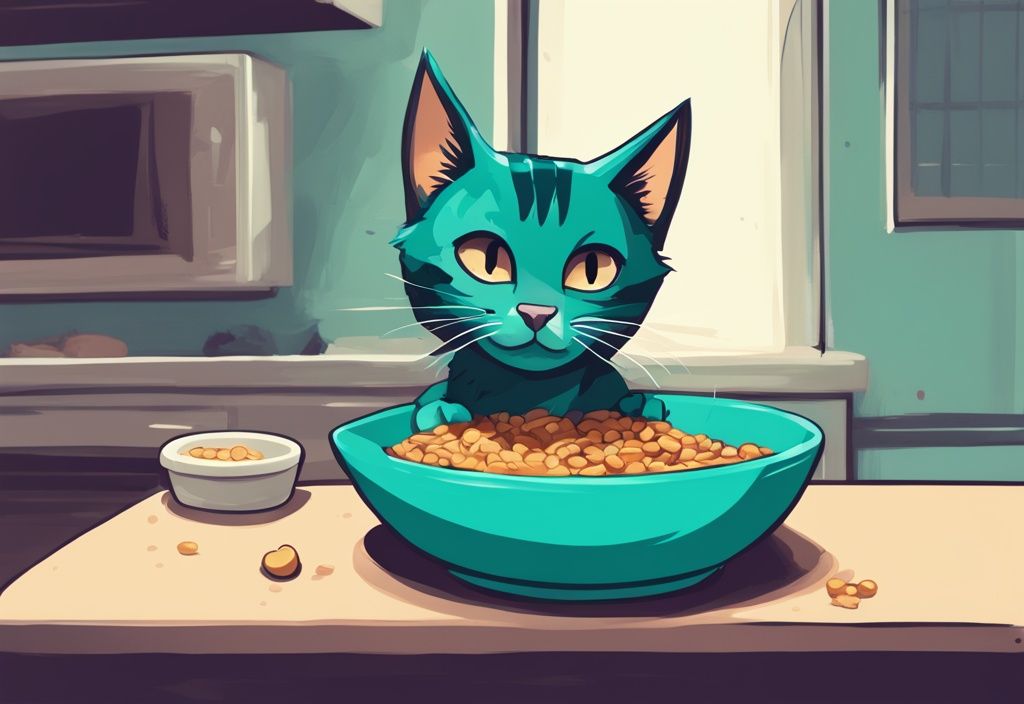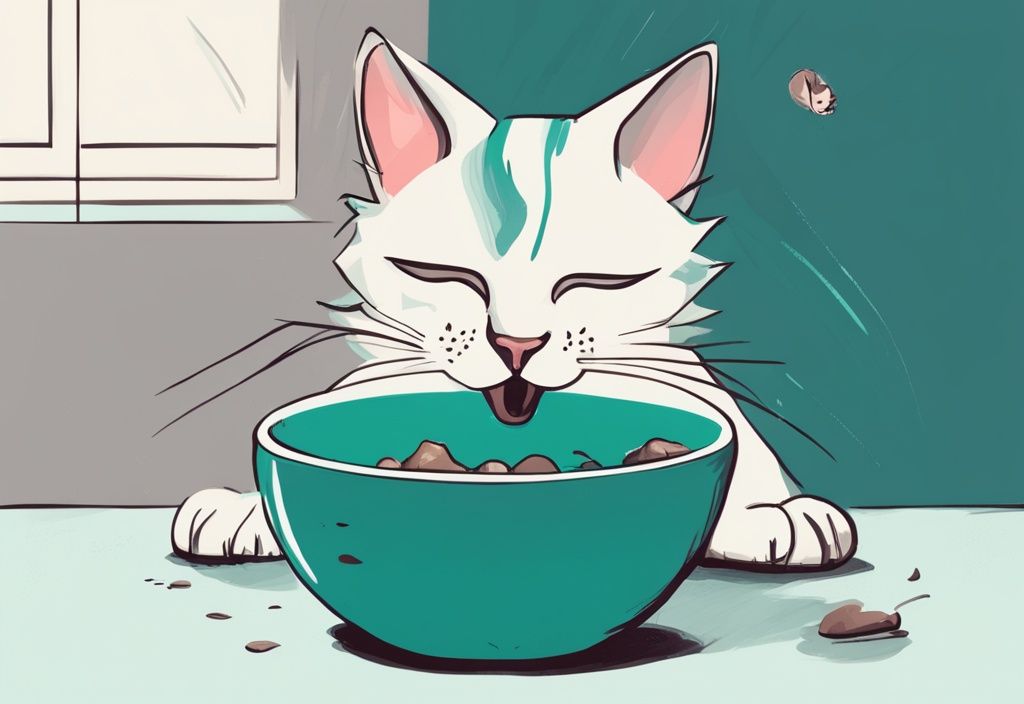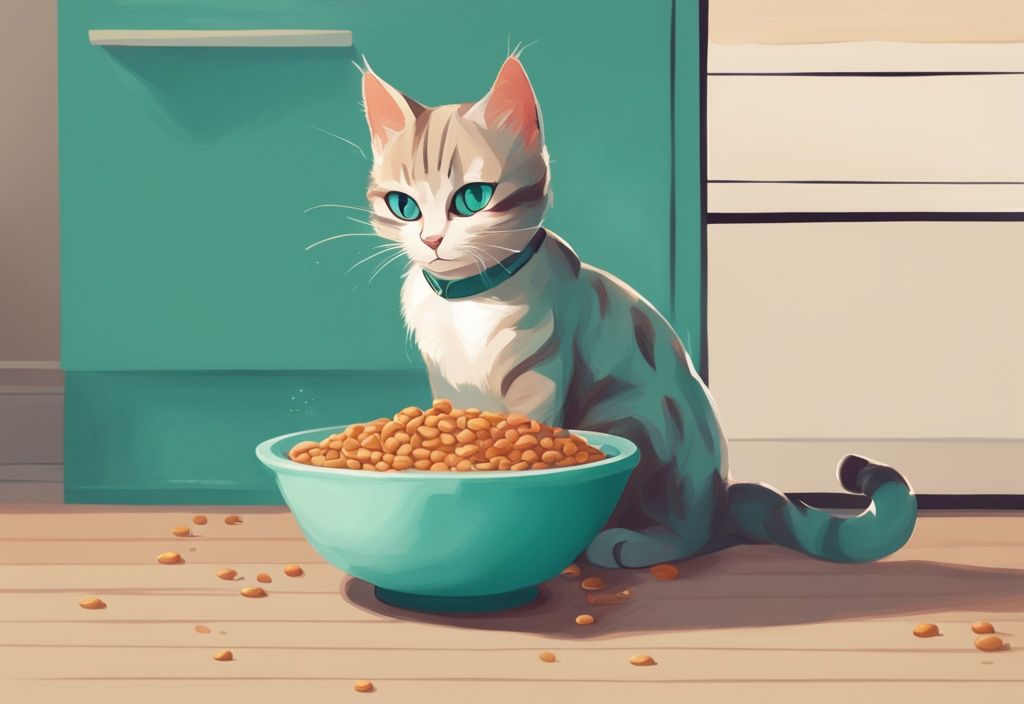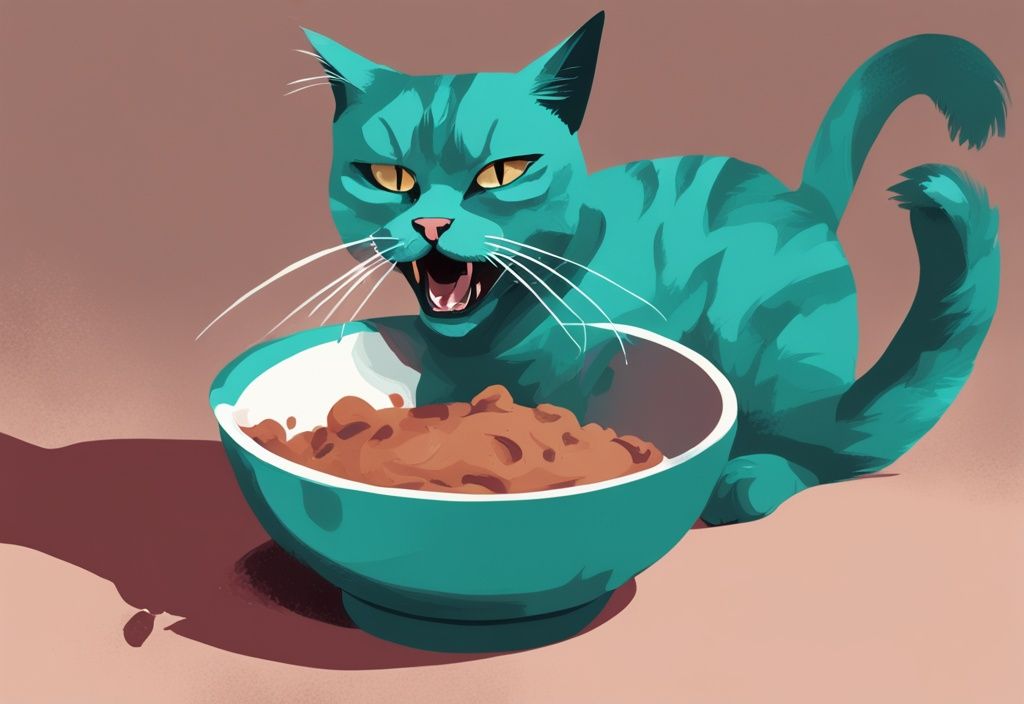Ever found yourself wondering, “Why does my cat meow after eating?” You’re not alone! Our whiskered friends can have us wrapped around their fluffy tails with their vocal shenanigans, especially when it happens right after a meal. Together, let’s dive headfirst into the enigma that is your pet’s post-dinner serenade!
In this handy guide, we’ll shed light on the reasons behind your feline’s unique behavior, exploring everything from attention-seeking antics to potential health concerns. Understanding these signals can deepen your bond with your kitty and ensure they’re purring in perfect health.
With the right insights and a sprinkle of Lindsey’s lovable anecdotes, addressing and managing your cat’s dining-time meowing will feel like a piece of cake, or rather, a piece of tuna!
Insider’s Look into Cats’ Vocalization Habits
Ever wonder why your cat meows after eating? Understanding these quirks can deepen your bond and ensure your feline friend’s needs are met.
Why Cats Choose Meowing as Communication Medium
Cats have developed meowing as a unique form of communication, primarily intended for interaction with their human companions. Unlike other vocalizations they use to communicate with fellow cats, meowing is tailored to grab human attention and convey specific messages. The meows’ tone, frequency, and intensity may vary according to the situation, making it essential to understand each nuance.
Different vocal patterns serve different purposes. For instance, a soft, high-pitched meow might be a polite request for food, while a loud yowl could indicate discomfort or a demand for immediate attention. Cats often meow to indicate hunger, desiring human interaction, or expressing contentment. Each cat has a unique vocal habit shaped by its personality, environment, and past experiences.
Deciphering your cat’s individual vocal patterns can greatly improve the communication between you and your feline friend, helping you understand when they are hungry, seeking attention, or simply expressing themselves. Being attuned to these cues can make interactions more fulfilling and ensure your cat’s needs are met promptly.
Reasons Why Your Cat Meows After Eating
Ever wondered what’s on your cat’s mind when it starts serenading you right after a meal? Let’s dive into some purr-spectives!
Do They Seek Attention Post-Mealtime?
Cats often meow after meals to seek attention or reassurance from their humans. This behavior is particularly prominent in cats that share a strong bond with their people. Imagine it as a little “Hey, let’s hang out!” signal. Feeding times are frequently intertwined with moments of togetherness, so the post-meal meow could simply be your cat’s way of wanting to continue the fun. It’s their charming way of saying, “That was delicious, now how about some cuddles or playtime?”
Could it Mean Satisfaction or Gratitude?
Another reason your furry friend might meow after eating is to express satisfaction or perhaps even gratitude. Think of it as your cat’s version of saying “Thank you!” A contented meow can indicate that your cat thoroughly enjoyed their meal and feels pleasantly full. This behavior can be more noticeable in cats who’ve previously faced food insecurity or are adopted rescues. For these kitties, the post-meal vocalization might be their unique way of showing appreciation for a good meal, reflecting their happiness and well-being.

So, the next time Whiskers meows after chowing down, it could be a heartfelt thank-you, a call for a little more attention, or simply a sign of sheer contentment.
Isn’t that just whisker-twistingly sweet?
Interpreting Your Cat’s Post-Eating Behaviour
Are you baffled by your cat’s mysterious meowing after they’ve had their fill? This intriguing behavior can stem from various factors. Let’s dive into why your furball might be vocalizing after a meal by exploring their past experiences and how habits form.
Decoding Their Past Experiences
Understanding why your cat meows after eating often requires a look into their past. Especially for former stray or shelter cats, previous experiences significantly influence post-eating vocalizations. For instance, cats that have dealt with food insecurity may meow as a way to ensure they will consistently receive meals. This behavior is deeply ingrained as a survival mechanism.
Imagine Whiskers, my cuddly rescue cat, who used to meow up a storm after every meal during her first months at home. It took some time for me to realize that she was just echoing her past worries about food scarcity. By understanding your cat’s background, you can better comprehend certain vocal habits and provide the reassurance they need, aiding in the transition to a more secure environment.
Understanding Habit Formation via Positive Reinforcement
Cats are fantastic learners, and their behaviors can be shaped by positive reinforcement. If you’ve rewarded your cat with attention or treats after they meow post-eating, they may develop this habit.
Think about it: if every time Max, my Border Collie, barked, I gave him a treat, he’d likely keep barking. The same principle applies to cats. Repeatedly receiving positive responses reinforces the behavior, causing it to persist. Observing and adjusting the rewards you give can help manage and modify excessive meowing. By selectively reinforcing quieter behaviors and being consistent with your actions, you can help your cat form new, less vocal habits.
It’s all about understanding and subtle training, transforming their meow-symphonies into a peaceful post-meal quiet.
Health Concerns That Could Cause Post-Eating Meowing
In this section, we explore a few health-related reasons why your feline friend might be vocalizing after a meal. Understanding the potential underlying issues can help you ensure your cat remains happy and healthy.
Is it a Digestive Issue?
Unpacking Indigestion and Gas
Digestive issues like indigestion, gas, or constipation can often be the sneaky culprits behind why your cat meows after eating. These conditions cause significant discomfort, and cats, being the expressive creatures they are, might just let you know through those melodious meows. Certain food types can exacerbate these issues, so keeping a keen eye on your cat’s diet is essential. Noting any foods that cause adverse reactions can help you make necessary changes. Plus, seeking veterinary advice can be a game-changer in ensuring Whiskers has a comfy post-meal nap.
Role of Food Allergies
Just like us, cats can have food allergies that lead to discomfort and post-meal meowing. Identifying and eliminating specific allergens from your cat’s diet can make a world of difference. Common culprits might be certain proteins or additives in commercial cat food. Don’t fret. Consulting with a vet to conduct an elimination diet can help pinpoint the exact cause and create a diet plan that avoids these ingredients, paving the way for a much happier and quieter meal time.

Dental Problems: A Silent Troublemaker
Dental issues are another big reason why your cat might meow after eating. Conditions like tooth decay, plaque buildup, or abscesses can cause considerable pain during chow time. And trust me, if Max or Whiskers were in pain, they’d let me know! Cats with dental woes may vocalize due to the discomfort. Regular dental check-ups are a must to catch these issues early and tackle them head-on. Good dental hygiene, brushing those tiny teeth, and providing dental treats can help prevent these problems, ensuring your feline enjoys every bite. If you’re curious about different pets, you might be interested in learning what kind of dog Bolt is.
Chronic Illness or Medical Conditions That Can Intervene
How Hyperthyroidism Influences Cat’s Behaviour
Hyperthyroidism, especially common in older cats, can lead to a ravenous appetite and increased vocalization, including after meals. This condition speeds up a cat’s metabolism, making them feel hungry all the time. Regular vet check-ups and blood tests can diagnose hyperthyroidism. Treatment can be a mix of medication, dietary changes, and sometimes radioactive iodine therapy. Managing hyperthyroidism effectively can help reduce those extra meows.
Does Kidney Disease Make My Cat Vocalize More?
Kidney disease, a frequent issue in older cats, can cause discomfort and increased meowing, especially after meals. Symptoms include increased thirst, frequent urination, and lethargy. Regular vet visits to monitor kidney function are crucial. Dietary tweaks, medications, and ensuring proper hydration can significantly enhance your cat’s quality of life, helping reduce those post-meal vocalizations.
How Diabetes Can Alter Your Cat’s Feeding Experience
Diabetes can bring about substantial changes in your cat’s appetite and energy levels, leading to more meowing. Cats with diabetes might meow more due to fluctuating blood sugar levels, making them feel pretty weird after meals. Managing diabetes involves regular blood sugar monitoring, a consistent feeding schedule, and insulin if needed. Adjusting the diet to include diabetic-friendly foods can help manage symptoms and cut down on related vocalizations.
Are Older Cats More Likely to Vocalize After Eating?
Understanding Cognitive Decline
Cognitive decline, or feline cognitive dysfunction, is common in older cats and can lead to increased meowing due to confusion or anxiety. Symptoms might include disorientation, changes in sleeping patterns, and yes, more vocalization. If you’re dealing with a dog ear hematoma, you might be interested in learning how to treat it at home. Creating a stable and supportive environment can help with these symptoms. Vet consultations might offer strategies and, sometimes, medications to manage cognitive decline, lifting the overall well-being of your aging kitty.
How Hearing Loss May Impact Their Behaviour
Hearing loss in older cats can lead to more frequent meowing, as they might feel anxious or need extra reassurance. Without effective hearing, cats can feel isolated, prompting them to vocalize more, including after meals. Understanding their needs and showering them with extra comfort and attention can help manage this behavior. A vet can offer strategies to communicate and support your aging furry friend better.
Solutions to Manage Excessive Meowing Post-Eating
Discovering why your cat meows after eating can be quite the adventure. By documenting mealtimes, food types, and meowing instances, you can identify specific patterns and triggers. This detailed log can help you understand if your kitty’s vocal habits are due to hunger, social interaction, or potential health issues. Using this information, you’ll be better equipped to address the root causes and manage your feline friend’s post-dining chatter.
Importance of Identifying Patterns
Understanding why your cat meows after eating requires careful observation and documentation. By keeping a log of mealtimes, food types, and instances of meowing, you can identify specific patterns and triggers. This detailed record helps you pinpoint the underlying causes, whether they be related to hunger, social interaction, or potential health issues. Armed with this information, you can more effectively address the root causes and manage your cat’s vocal habits.
Tips on Behavioural Training
Behavioral training can be a valuable tool in reducing excessive meowing after meals. Reinforcing quiet times with positive rewards, such as treats or affection, encourages better behavior. Gradual changes are crucial; start by rewarding silence immediately after eating and progressively extend the quiet periods before offering rewards. Consistency is key to ensuring the new behavior becomes a habit. Training should be patient and adjusted to fit your cat’s unique disposition and history.
Could Adjusting Feeding Schedules and Diet Help?
Adjusting feeding schedules and portion sizes can greatly influence meowing behavior. Feeding smaller, more frequent meals throughout the day can help manage hunger-related meowing. Additionally, experimenting with different food types can identify any diet-related discomfort. For example, choosing easily digestible foods can alleviate gastrointestinal issues, potentially reducing post-eating vocalizations. Always consult with a veterinarian before making significant changes to your cat’s diet.
Recognizing When it’s Time to Consult a Vet
If excessive meowing persists despite your efforts, it may indicate an underlying medical issue that necessitates professional attention. Conditions such as dental problems, digestive issues, or chronic illnesses like hyperthyroidism or kidney disease can cause discomfort that leads to increased vocalization. Consulting a vet for a comprehensive examination is crucial to rule out health concerns and find appropriate solutions. Regular check-ups can also help in early detection and management of potential health problems.

Conclusion
Understanding why does my cat meow after eating involves diving into their quirky little world of meows, purrs, and tail flicks. At the heart of it, your cat’s meowing habits could be attributed to various reasons such as communication, health issues, or past experiences.
Cats use meowing as their primary mode of interaction with us humans—yes, even more so than their infamous stares! After eating, your cat might be seeking a bit of extra attention or expressing satisfaction, almost like a little “Thank you, hooman!” This is especially common in rescued or adopted cats who, in their newfound comfort, may just be showing their appreciation and contentment.
Then there’s the factor of previous experiences. Cats that have faced food insecurity or lived as strays may develop a habit of meowing post-meal. It’s like they’re saying, “More, please!” or ensuring that the food keeps coming. Recognizing these unique backgrounds is crucial in understanding their vocal habits.
Health concerns definitely play a part too. Digestive issues like indigestion, gas, or food allergies can be uncomfortable, making your cat vocalize. Dental problems or chronic illnesses such as hyperthyroidism, kidney disease, and diabetes can also make them meow after eating, owing to pain or discomfort.
For older cats, cognitive decline and hearing loss can fuel anxiety, leading to more frequent meowing. Addressing these age-related changes can help you manage their vocal habits. Proper observation is key. If you’ve noticed unusual behaviors like your dog hiding under the bed all of a sudden, it’s important to understand the underlying causes. Learn more about why this behavior might occur. Keep a log of your cat’s mealtime behaviors and consult a vet if persistent meowing occurs. Adjusting feeding schedules, experimenting with different diets, and implementing behavioral training strategies can also work wonders in curbing excessive vocal habits.
Remember, understanding the multifaceted reasons behind why does my cat meow after eating can enhance your pet’s well-being and strengthen the bond between you and your feline friend.
FAQ
Why does my cat meow immediately after eating?
Oh, the curious sounds of our feline friends! Cats might meow right after eating for a mix of reasons. They could be seeking your attention, basking in the satisfaction of a good meal, or calling out for a bit of social interaction. Sometimes, it might even hint at digestive discomfort. It’s all about tuning into your cat’s unique quirks and decoding their special meows.
Can dental issues cause my cat to meow after eating?
Absolutely! Dental problems like tooth decay, gingivitis, or abscesses can cause a lot of discomfort during or after meals, leading your cat to vocalize in distress. That’s why regular dental check-ups are a must—they can spot these issues early and keep your kitty’s chompers healthy.
How can I tell if my cat’s meowing is due to digestive problems?
If you suspect your cat’s meowing has a digestive cause, keep an eye out for other tell-tale signs. Vomiting, diarrhea, constipation, or a sudden change in appetite can all be red flags. When in doubt, a vet visit is the best course of action to get to the bottom of it and ensure your furry friend gets the care they need.
Is it normal for older cats to meow more after eating?
Yes, it’s quite common for older cats to meow more frequently post-meal. This could be due to cognitive decline, hearing loss, or other age-related health concerns. A vet can help diagnose and provide strategies to manage these changes, keeping your senior kitty comfortable and happy.
What should I do if my cat’s meowing becomes excessive after meals?
If your cat turns into a chatterbox after eating, start by observing any patterns and triggers. Adjusting feeding schedules, switching up their diet, or even trying some behavioral training can make a big difference. And don’t forget, a vet consultation is always a good step to rule out any underlying medical issues. This balanced approach can help manage and reduce that excessive meowing.
